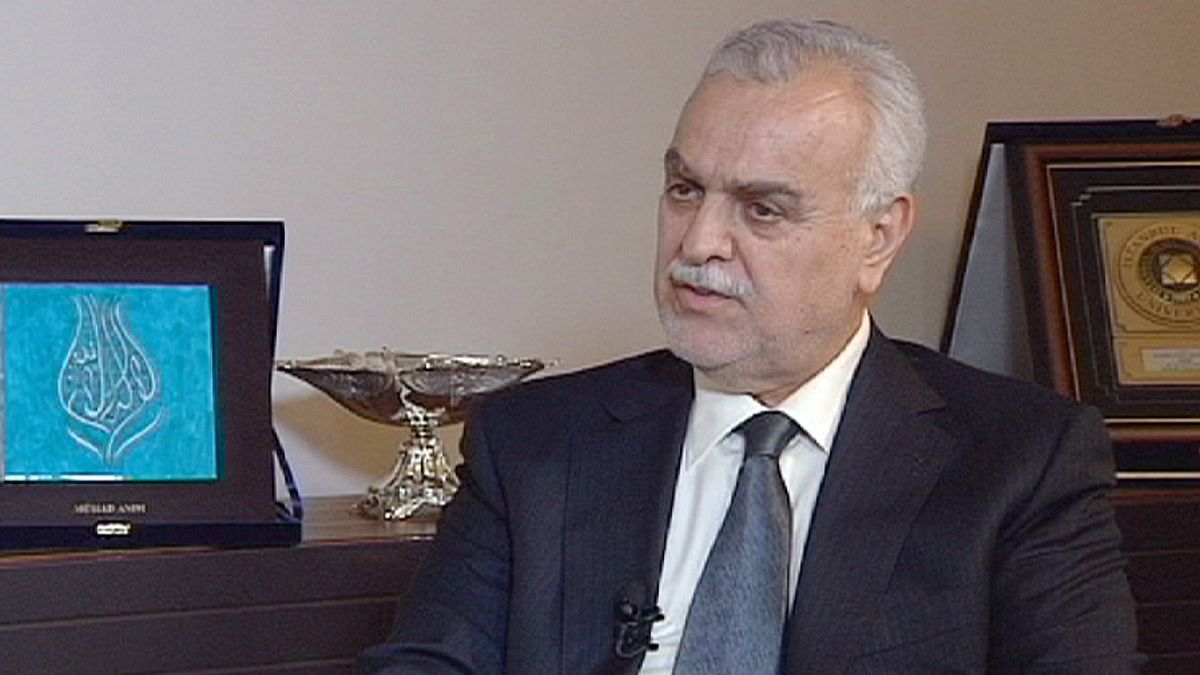Tariq al-Hashimi, Sunni Vice-President of Iraq, is fighting for political survival after being accused of having links to terrorism, an allegation he strenuously denies. He spoke to euronews about sectarianism, Iran and security worries in Iraq.
euronews: “I want to start with the latest bombing attacks in Iraq. The cities which were targeted are the most sensitive: Samara, Kirkuk and Baghdad, where sectarian violence is very high. How do you see these latest incidents?”
Tariq al-Hashimi: “Well unfortunately, this is just new evidence that we do not have any qualified management for security. The terrorists have in fact managed to target innocent people as well as the institution of the government from time to time.
“This time, as you’re fully aware, it’s not only one particular community being targeted, it is mixed. Apparently all Iraqis are now being targeted by terrorists. It is quite normal because I kept criticising the way the chief in command ran security in Iraq and this could happen at anytime in the future. The problem is that, regardless of the numbers of troops you have, regardless of the billions of dollars that have been dedicated since 2003, we don’t have qualified security forces that can match the actual security challenges that Iraq is facing.
“How many times have we made an appeal to Prime Minister Nouri Maliki that you should be humble and give factual assessments to the Iraqi people and apologise for penetrations because people – innocent people, the Iraqi average citizen – are suffering, not the high ranking staff in the government, who are all protected by bodyguards. But the problem is about the average citizen who is targeted from time to time. Nobody cares about that.”
euronews: “Who do you think is launching these attacks?”
Tariq al-Hashimi: “The situation in Iraq is that the political process is fragile. We are facing a lot of challenges. Many parties are not convinced or sympathetic enough to keep to the work of getting Iraq stable. We do have many, many, many sources of violence for the time being. It is not only al Qaeda. Even the corruption of the security forces could be a source of violence. We do have real challenges and I am sorry to say that my country cannot sustain stability for years to come because we do have big challenges that we are unable to overcome for now.”
euronews: “These attacks look like they are trying to add more fuel to sectarian differences. It appears to me that Iraq is moving into more sectarian politics. Do you agree with that?”
Tariq al-Hashimi: “The problem for the time being is politics, more than sectarian strife but I can’t hide the fact that this political instability is being to some extent covered by sectarian paint. That is clear. Targeting Tariq al-Hashimi unnecessarily in fact, with all these sort of allegations. People understand that this is sectarian targeting and regardless of a political motivated case. So we do have a challenge in this regard.”
euronews: “How dangerous do you think these ethnic and sectarian policies are? Do you think at a point, Iraq will be divided among these three different groups?”
Tariq al-Hashimi: “I hope this is not going to happen because at the end of the day there would be not only my country suffering chaos – political chaos but I am sure the whole region would suffer as well. Because Iraq, as you’re fully aware, is a rich country and any split in the geographical structure is going to attract neighbouring countries to interfere in our internal issues and there will be a big fight in the Middle East on Iraq as well. So this formula does not serve the national interest of Iraq, or the stability of the whole region.”
euronews: “What about regional powers like Iran, Turkey, and some other countries – Saudi Arabia, we can also add to this, the United States – do they have an interest in keeping Iraq unified or do you think some powers are on the other side of the equation?”
Tariq al-Hashimi: “I could talk from my own experience and the dialogue I had just recently when I was visiting Saudi Arabia and Qatar and Turkey for instance. Three countries which have influence and significant power in the Middle East. They are very much concerned about the stability of Iraq and they are very willing for all Iraqi social components to come together and try to re-consolidate in their differences, to maintain and achieve sustainable unity in Iraq.”
euronews: “What about Iran I mean.. ?”
Tariq al-Hashimi: (interrupts) “The problem is, Iran is pushing vigorously for sectarian strife. I must be fair in my analysis. If I compare the policy of Iran historically, this is not a new phenomenon. Iran is behind sectarian strife in my country. Otherwise the Iraqis would have no culture in sectarian philosophy or sectarian behaviour. We used to live in Iraq and respect our roots without even asking our neighbours or friends – but today, no. Unfortunately you have to ask, you have to identify. So this culture came as a by-product from the Americans and it has been enhanced and promoted by Iran. This is what has happened.
“So the policy of Iran is quite different to Turkey. As far as I am concerned, I am talking about my experience, I’m not exaggerating things, I am not an anti-Iranian politician but I have to address things on a factual bases and from my own experience.”
